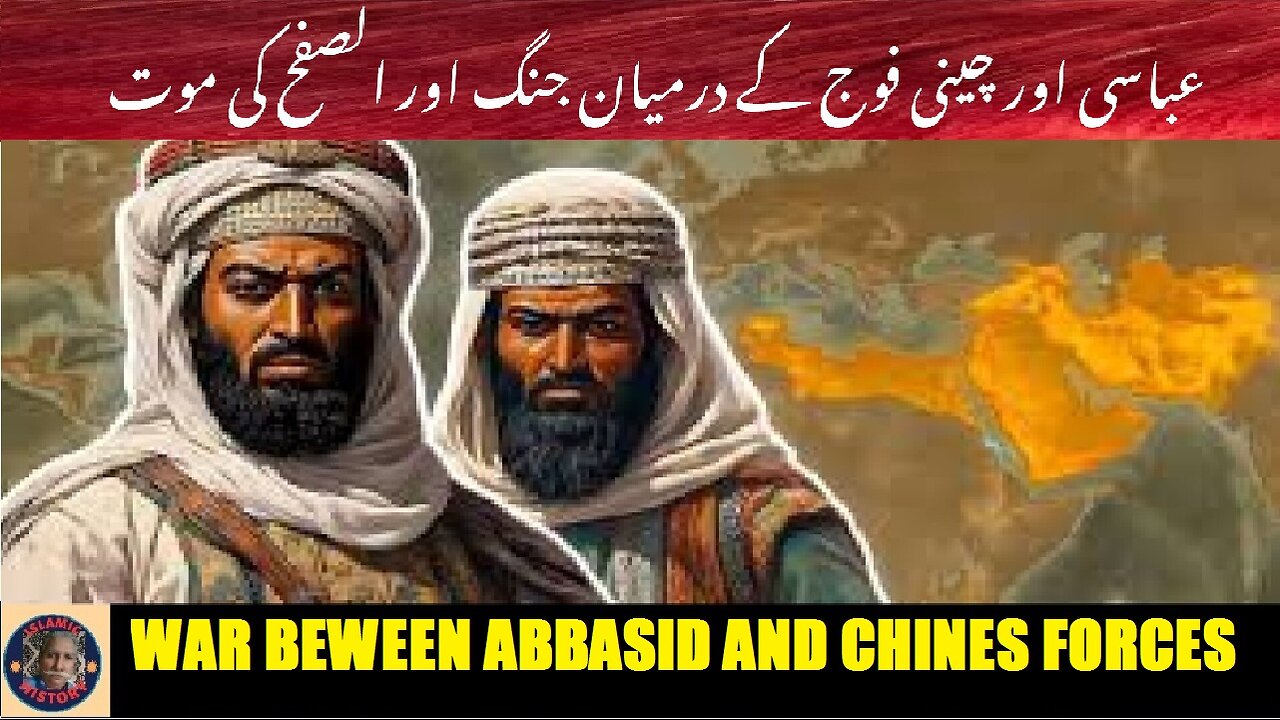Premium Only Content

War between Abbasid and Chinese Force | عباسی اور چینی فوج کے درمیان جنگ اور الصفح کی موت
@islamichistory813 #MedievalWarfare #AlSaffah #HistoricalAnalysis
War between Abbasid and Chinese Force and death of Al-Saffah
Dekhti Aankhooon aur sountay kaanoon ko Asslamoalaikum, sisters, brothers friends and elders, In this informative video, we are describing the war between the Abbasid Caliphate and the Chinese military, focusing on the pivotal role of Al-Saffah, the first caliph of the Abbasid dynasty. We will discuss the causes of the conflict, the strategies employed by both sides, and the eventual demise of Al-Saffah. This exploration offers valuable insights into the dynamics of power and warfare in the medieval era.
In the month of July 751, the Abbasid forces joined in combat with the Tang Chinese force (the combined army of Tang Chinese and Karluk mercenaries) on the banks of the Talas river.
The Tang army was subjected to a devastating defeat. The Tang dynasty's defeat was due to the defection of Karluk mercenaries and the retreat of Ferghana allies who originally supported the Chinese. The Karluk mercenaries, two-thirds of the Tang army, defected to the Abbasids during the battle; Karluk troops attacked the Tang army from close quarters while the main Abbasid forces attacked from the front. The Tang troops were unable to hold their positions, and the commander of the Tang forces, Gao Xianzhi, recognized that defeat was imminent and managed to escape with some of his Tang regulars with the help of Li Siye. Out of an estimated 10,000 Tang troops, only 2,000 managed to return from Talas to their territory in Central Asia. Despite losing the battle, Li did inflict heavy losses on the pursuing Arab army after being reproached by Duan Xiushi. After the battle, Gao was prepared to organize another Tang army against the Arabs when the devastating An Shi Rebellion broke out in 755. When the Tang capital was taken by rebels, all Chinese armies stationed in Central Asia were ordered back to China proper to crush the rebellion.
Also in 751, the Byzantine Emperor Constantine V led an invasion across the frontier of the Caliphate. The Byzantines captured Theodosiopolis (Erzurum) and Melitene (Malatya), which was demolished. There was no serious attempt to retain control of the captured cities, except for Camachum (modern Kemah, Erzincan), which was garrisoned.
As-Saffah died after a five-year reign and al-Mansur took on the responsibility of establishing the Abbasid caliphate by holding on to power for nearly 22 years, from Dhu al-Hijjah 136 AH until Dhu al-Hijjah 158 AH (754 – 775). Al-Mansur was proclaimed Caliph on his way to Mecca in the year 753 (136 AH) and was inaugurated the following year.[15] Abu Ja'far Abdallah ibn Muhammad took the name al-Mansur ("the victorious") and agreed to make his nephew Isa ibn Musa his Heir to the Abbasid caliphate. This agreement was supposed to resolve rivalries in the Abbasid family, but al-Mansur's right to accession was particularly challenged by his uncle Abdullah ibn Ali. Once in power, caliph al-Mansur had his uncle imprisoned in 754 and killed in 764.
Al-Saffah was the First Arab caliph from the Caliphal Abbasid dynasty. He nominated his brother Abu Ja'far Abdallah as heir, because his own son was too young to succeeded to the Caliphate. His brother nominated his son (al-Saffah's nephew) as heir. Al-Saffah's nephew nominated his two sons as heir. Even though al-Saffah's son never ascended to Caliphate, his children remained influential. In 761, his nephew Muhammad (future caliph al-Mahdi) married Rayta as his first wife after his return from Khurasan. She gave birth to two sons, Ubaydallah and Ali. His elder grandson, Ubaydallah was appointed as governor of Arminiyah and the northwestern provinces in 788/9. He was later appointed to two brief stints as governor of Egypt, in 795 and 796. His second grandson, Ali was the uncle and father-in-law of sixth Abbasid caliph al-Amin through his daughter Lubana.
So sisters brothers friends and elders, tomorow we are going to described Biography of Islamic Warrior leader al-Mansur. Allah hafiz
========================================
-
 18:58
18:58
ISLAMIC HISTORY
19 hours agoRabi-ul-Awwal Special Biography of Prophet Muhammad (PBUH) Part-2 سیرت نبوی صلی اللہ علیہ وسلم
11 -
 LIVE
LIVE
FyrBorne
10 hours ago🔴Warzone M&K Sniping: Through the Fyr And Flames (Of SBMM)
58 watching -
 LIVE
LIVE
Dorian_D
1 day ago🔴 Dorian's First-Time Mega Man Legends 2 Playthrough: Full Gameplay Adventure!
51 watching -
 LIVE
LIVE
Lofi Girl
2 years agoSynthwave Radio 🌌 - beats to chill/game to
343 watching -
 2:18:15
2:18:15
Side Scrollers Podcast
21 hours agoBlizzard BANS Player for Saying “n00b” + Cracker Barrel Ends PRIDE Funding + MORE | Side Scrollers
57.1K27 -
 19:54
19:54
GritsGG
17 hours agoMAX SR Win on Warzone! Ranked Tips for Loadout & Landing Spot!
22.1K -
 44:41
44:41
Inverted World Live
16 hours agoPolitical Violence in Minnesota w/ AK Kamara
179K20 -
 6:29:40
6:29:40
SpartakusLIVE
16 hours ago#1 Massive MEAT-HEAD can't stop WINNING, can't stop FLEXING
96.6K -
 5:09:25
5:09:25
Drew Hernandez
16 hours agoGIDEON AI THREAT DETECTION SOFTWARE PUSH & NEW EPSTEIN EMAIL LEAK?
65.8K28 -
 2:03:51
2:03:51
TimcastIRL
12 hours agoTrans Minneapolis Shooter BLAMED Massacre On Mom & Gender Transition | Timcast IRL
212K399